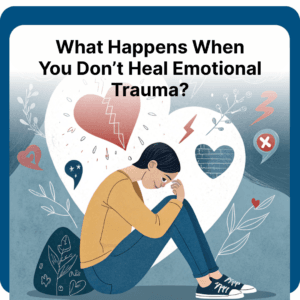Unprocessed Grief: The Weight You Forgot You Were Carrying
Table of Contents
The Grief That Hides Behind “I’m Fine”
Have you ever felt a profound sadness without a name?
An invisible lump in your chest that doesn’t quite go away?
Maybe you’ve said things like:
“I’m over it now.”
“It happened years ago.”
“There’s no point dwelling on the past.”
However, the truth is that not all grief wears black and only shows up at funerals.
Some of it hides in your body.
Some of it shows up as anxiety, anger, or isolation.
Some of it whispers: “You’re not allowed to feel this.”
This is unprocessed grief. And it’s more common than you think.
What Is Unprocessed Grief?
Grief is a natural emotional response to loss—loss of a loved one, a relationship, a job, an identity, or even a version of yourself. But when that grief isn’t fully acknowledged, expressed, or witnessed, it doesn’t just disappear.
It goes underground.
It lodges itself in your nervous system, your breath, and your behaviours.
It becomes:
- Chronic fatigue
- Emotional numbness
- Overthinking
- Emotional triggers
- Unexplained sadness or rage
Unprocessed grief is grief that’s been ignored, suppressed, or rushed through—because life said, “Move on.”
But your body remembers what your mind tries to forget.
Cultural Silence and Emotional Suppression
In Indian society, we’re not taught to grieve—we’re taught to perform resilience.
You’re expected to be strong. To adjust. To accept.
After a loss, people say:
“Be brave.”
“Time heals all.”
“God has a plan.”
While well-meaning, these phrases often bypass the real pain. There’s rarely space for messy, raw grief. Especially not for women, caregivers, or “the strong ones” in the family.
So the grief gets internalized.
According to a study in the Indian Journal of Psychiatry (2021), nearly 45% of adults experience unresolved grief-related distress, but only a fraction seek help due to stigma or lack of awareness.
The Surprising Ways Unprocessed Grief Affects You
Grief doesn’t always scream. Sometimes it…
- shows up as anxiety
- Feels like a tight chest or chronic neck pain
- makes it hard to connect in relationships
- keeps you stuck in overachieving or numbing behaviours
- turns into anger, especially in men and children
- causes emotional detachment or guilt
Grief is not just sadness. It’s a disruption of emotional flow.
And when it’s frozen inside, it keeps replaying in your subconscious, blocking joy, intimacy, and even physical health.
Is This You? Signs You May Have Unprocessed Grief
Is This You? Signs You May Have Unprocessed Grief
- You avoid talking about certain memories
- You experience random emotional breakdowns
- You feel stuck, like life is moving, but you’re frozen
- You over-function to avoid feeling anything
- You can’t remember the last time you truly felt joy
- Your body carries tension you can’t explain
If you nodded at any of these… It’s time to ask:
“What have I not fully grieved?”
Healing the Grief Beneath the Surface
True healing doesn’t mean forgetting the past.
It means finally feeling safe enough to feel it.
That’s where modalities like Family Constellation Therapy and Inner Child Healing come in.
These are not just “talk therapies.” They go beyond logic, into the energetic and emotional roots of your pain.
Family Constellation Therapy: Grieving What Wasn’t Yours to Carry
Family Constellation Therapy reveals how grief—especially generational grief—can be passed down unconsciously through family systems.
Maybe you’re carrying:
- The sadness of a parent who never healed
- Guilt from a miscarriage or abortion is never acknowledged
- A sense of responsibility for a sibling who passed
- A loyalty to someone else’s pain that blocks your healing
“What you do not mourn, your body will.”
In a constellation session, you can see these entanglements.
And through the process, you’re able to release inherited grief, restore order, and find peace.
Inner Child Healing: Giving Space to the Grief of Your Younger Self
Your inner child remembers every loss.
The friend who moved away.
The parent who left.
The moment you were told not to cry.
She never got to grieve. She just learned to cope.
Through Inner Child Healing, you reconnect with that part of you.
You listen, nurture, and allow her to express what was never safe to feel.
You give her the love and permission she was denied.
This work is gentle, profound, and deeply liberating.
Real Stories, Real Shifts
🧕 Meera, a 35-year-old teacher, came for chronic fatigue. What emerged? Unprocessed grief from a stillborn child, no one spoke about. After one constellation and three inner child sessions, her vitality returned. She said,
“For the first time, I felt like I was allowed to remember—and also to live.”
👨💼 Ravi, 42, had anger issues and struggled with closeness. His constellation revealed entanglement with his grandfather, who died by suicide. The healing brought relief he didn’t know was possible.
Grief doesn’t need to be dramatic to be devastating.
Healing doesn’t need to be dramatic to be life-changing.
Scientific Backing for Grief and Energy Healing
A 2020 study published in the Journal of Psychosomatic Research showed that unresolved grief increases the risk of depression, cardiovascular issues, and sleep disturbances.
Another study in the International Journal of Psychology and Counseling found that somatic therapies like Family Constellations and inner child work reduce emotional distress, grief retention, and psychosomatic symptoms.
Your Next Step: Let the Healing Begin
At The Healing Room, we offer safe, compassionate spaces for you to process what’s been buried.
You don’t need to carry this alone.
You don’t need to explain it perfectly.
You just need to say: “I’m ready.”
🌀 Join a Family Constellation Therapy Session or begin Inner Child Healing with Sonali Mittra.
In-person and online sessions are available.
Book your journey at 👉 BOOK NOW
Grief Is Not a Weakness—It’s a Portal
You’re not broken because you’re still grieving.
You’re human. And brave. And finally listening.
Unprocessed grief isn’t about “moving on.” It’s about moving through with love, support, and healing.
Whether you lost someone, something, or a part of yourself, that grief deserves to be honoured, not hidden.
Healing begins when we feel safe enough to remember.
Let this be your invitation.



